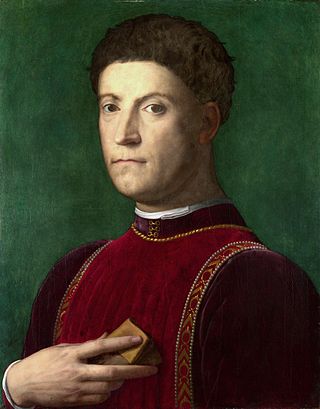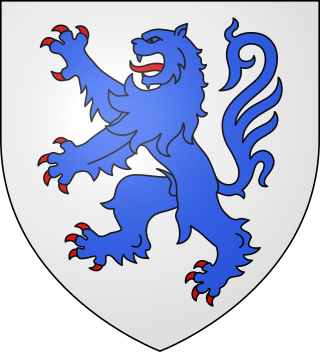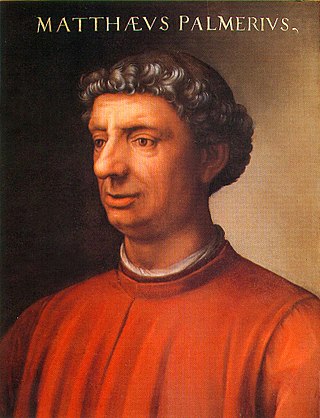
Giovanni Boccaccio was an Italian writer, poet, correspondent of Petrarch, and an important Renaissance humanist. Born in the town of Certaldo, he became so well known as a writer that he was sometimes simply known as "the Certaldese" and one of the most important figures in the European literary panorama of the fourteenth century. Some scholars define him as the greatest European prose writer of his time, a versatile writer who amalgamated different literary trends and genres, making them converge in original works, thanks to a creative activity exercised under the banner of experimentalism.

Piero di Cosimo de' Medici, known as Piero the Gouty, was the de facto ruler of Florence from 1464 to 1469, during the Italian Renaissance.

Lorenzo di Pierfrancesco de' Medici, nicknamed the Popolano, was an Italian banker and politician, the brother of Giovanni il Popolano. He belonged to the junior branch of the House of Medici of Florence.

The Duchy of Athens was one of the Crusader states set up in Greece after the conquest of the Byzantine Empire during the Fourth Crusade as part of the process known as Frankokratia, encompassing the regions of Attica and Boeotia, and surviving until its conquest by the Ottoman Empire in the 15th century.

The Acciaioli family, also spelled Acciaiuoli, Accioly, Acciajuoli or Acioli was an important Italian noble family from Florence, whose members were the ruling Dukes of Athens.

Donato Acciaioli was an Italian scholar and statesman. He was known for his learning, especially in Greek and mathematics, and for his services to his native state, the Republic of Florence.
Angelo II Acciaioli was an Italian Catholic cardinal.
Zanobi Acciaioli was an Italian Dominican friar, a member of the Acciaioli family of Florence. He was Librarian of the Vatican under Leo X. He joined the Dominican convent on 8 December 1495. He learned Greek and Hebrew towards the latter part of his life, and was appointed in 1518 prefect of the Vatican Library.

Rinaldo degli Albizzi (1370–1442) was an Italian nobleman, a member of the Florentine family of the Albizzi. Along with Palla Strozzi, he was the primary opponent of Cosimo de' Medici's rise in Florence.

Nerio I Acciaioli or Acciajuoli was the de facto Duke of Athens from 1385 to 1388, after which he reigned uncontested until his death in 1394. Born to a family of Florentine bankers, he became the principal agent of his influential kinsman, Niccolò Acciaioli, in Frankish Greece in 1360. He purchased large domains in the Principality of Achaea and administered them independently of the absent princes. He hired mercenaries and conquered Megara, a strategically important fortress in the Duchy of Athens, in 1374 or 1375. His troops again invaded the duchy in 1385. The Catalans who remained loyal to King Peter IV of Aragon could only keep the Acropolis of Athens, but they were also forced into surrender in 1388.

Antonio I Acciaioli, also known as Anthony I Acciaioli or Antonio I Acciajuoli, was Duke of Athens from 1403.
Gabriele Serbelloni, better known as Gabrio Serbelloni, was an Italian condottiero and general. A noble by birth, he achieved an even higher status through his military accomplishments as well as his family connections. He defended Asti against the French in 1551 and was made governor of Saluzzo after conquering the town. He was made Captain General of the Papal Guard in 1559 when one of his cousins was elected pope. Later he entered the service of Philip II of Spain, joined the Knights of Malta and received the title Prior of Hungary. He took part in the suppression of the Dutch Revolt in 1567 and captured Tunis in 1573. He was humiliated when the town was besieged and captured by Ottoman forces. He was later released in a prisoner of war exchange and eventually died in Milan.

Matteo di Marco Palmieri (1406–1475) was a Florentine humanist and historian who is best known for his work Della vita civile which advocated civic humanism, and his influence in refining the Tuscan vernacular to the same level as Latin. He was sent as Florentine ambassador to the court of Alfonso I of Naples. Vespasiano da Bisticci included him among the illustrious men of his generation whose careers deserved an article in his Vite di uomini illustri del secolo XVvita.

Pierfrancesco de' Medici the Elder was an Italian nobleman, banker, diplomat, and a member of the House of Medici of Florence.
Andrea Acciaioli or Acciaiuoli was an Italian noblewoman, as the Countess of Altavilla in the 14th century. Born in Florence, she was known through her brother to Giovanni Boccaccio, and was the person to whom he dedicated his book On Famous Women.

Angelo Acciaioli was an Italian Roman Catholic bishop from Florence.

Niccolò Acciaioli or Acciaiuoli was an Italian noble, a member of the Florentine banking family of the Acciaioli. He was the grand seneschal of the Kingdom of Naples and count of Melfi, Malta, and Gozo in the mid-fourteenth century. He was the son of Acciaiolo, a wealthy Florentine merchant. He had a sister by the name of Andrea Acciaioli.

The Sacchetti family is an Italian noble family originating in Tuscany, now resident in Rome, whose earliest documented member Merlo lived during the late 10th and early 11th centuries. The name of the family is derived from one or more members known as Sacchetto. According to Ugolino di Vieri (1438–1516),"nobile Sacchetti genus est, moenia primus romanus sangius".

The Fioravanti family was a noble family originating in Pistoia in Tuscany and active in Florence and other Italian towns. They were Guelf in their politics and naturally allied with the Cancellieri family and adversaries of the Ghibelline Panciatichi Panciatichi family. An early record dates to 1267, when Fioravanti d'Accorso was a member of the town council. In 1310 Ranieri, his son, was Mayor of the Pistoia. In 1319 Simone di Ranieri was a member of the elders. Giovanni di Puccio di Ranieri Fioravanti was a banker active at the court of Pope Clement V (1305-1314) in Avignon. Andrea di Simone di Baldo Fioravanti was elected Capitano della Montagna Superiore, June 17, 1354. Francesco di Rinieri was the Gonfaloniere of the Florentine Republic in the years 1385 and 1389: Neri his son was also Gonfaloniere in 1428; Fioravanti di Piero was the Cavalry Captain in Flanders in 1510 and then for Pope Alessandro VI, commissioner at Assedius of Faenza: Vincenzo di Cipriano one of the first to be elected knight of Santo Stefano, in 1576, shortly after the establishment of that military order, and later Chancellor of the Order: Fabio of Cipriano, was Cavalry Captain in the Netherlands: Alberto di Fioravanti Knight of Malta in 1590, and Commendatore in 1610: Niccolao di Fioravanti captain in the emperor Ferdinand II against the King of Sweden in 1636, and in 1643 in Tuscany for the Grand Duke against the Barberini.

Palazzo Acciaiuoli, also known as Palazzo Usimbardi' or Usimbardi-Acciaiuoli, is located in Borgo Santi Apostoli in the historical centre of Florence. It incorporates the older Torre degli Acciaiuoli, formerly dei Buondelmonti, located at the corner of Chiasso delle Misure. Today it houses a hotel.















